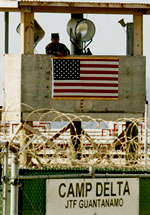- Revelations of Bush administration’s spying chills the Capitol (FCN, 01-05-2005)
- Anti terror laws produce new crisis for Black leadership (FCN, 12-25-2001)

NEW YORK (IPS/GIN) – Recent polling on the views of the U.S. public about the “Global War on Terror” (GWOT) suggests increasing ambivalence, confusion and lack of reliable information. Recent events, topped by the revelation that President George Bush ordered secret warrantless wiretaps of phone calls and emails of U.S. citizens, are unlikely to reverse this trend.
U.S. troops should withdraw from Iraq immediately. Or they should “stay the course.” Some civil liberties must be sacrificed in order to make the country secure from terror threats. Or civil liberties and security can both exist side by side.
Torture of prisoners in U.S. custody is never permissible. Or it is permissible under certain conditions. Former Iraqi president Saddam Hussein was linked to Osama bin Laden and the terror attacks of Sept. 11, 2001. Or there was no connection.
The people’s inability to get credible answers has led to their growing disapproval of both Congress and the president. In recent polling, disapproval of Congress hovers between 50 and 65 percent, while the President’s overall approval rating is now at 42 percent, a rise of four percentage points since he began a series of speeches in November to rally support for the war in Iraq, but well within the margin of error.
As the U.S. public struggles to understand pivotal questions related to the global “war on terror”–a task made far more difficult by the “spin” routinely articulated by politicians–the Bush administration, Congress and the courts find themselves wrestling to resolve many of the same problems.
The president’s wiretapping admission–and defense of it–came only a day after he refused to discuss the issue at all in an interview with Jim Lehrer of public television’s “Newshour.” The following afternoon, he used his entire live weekly radio address to say the wiretaps were necessary, legal and within his powers as commander-in-chief in wartime. He also said he had advised Congressional leaders, but those who have spoken publicly thus far refute this assertion.
Nancy Pelosi, the Democrats’ leader in the House of Representatives, said she raised objections. And former Florida Senator Bob Graham, who was chairman of the Senate Intelligence Committee at the time, said he was never told about the program during his time on the committee. He admitted attending a meeting in early 2002 in the vice president’s White House office about the National Security Agency, through which the surveillance was ordered, but claims it focused on other operations, such as monitoring overseas email traffic that flowed through Internet service providers based in the U.S.
But other leaders, including Republican Senators Arlen Specter of Pennsylvania, who is chairman of the Senate Judiciary Committee, and South Carolina’s Lindsey Graham, pointed out that Congress established a law and a procedure back in the 1970s for law enforcement authorities to ask a special court to issue warrants.
The court, reincarnated in the Patriot Act, is part of the Foreign Intelligence Surveillance Act (FISA), and is the court now used by the Justice Department to obtain authority to conduct surveillance of U.S. citizens.
It is still unclear why the President did not go through the FISA process. But a number of senators, including Michigan Democratic Carl Levin and Republican Lindsay of South Carolina, said they think the President may have broken the law by failing to do so.
Adding to people’s confusion is the ongoing debate about reauthorizing the Patriot Act, which was hurriedly passed six weeks after the 9/11 attacks in 2001 and which is due to expire on Dec. 31.
The House of Representatives and the Senate have been unable to reach unanimity on which body’s version of the new act will become law. As a result, a group of Senate Republicans and Democrats continue to debate the measure and have asked for a three-month extension of the current law to give them more time to work out their differences. The President has said he would veto such a request.
Two other terror-related issues recently added to the public’s confusion.

Government lawyers told the Supreme Court it would be “wholly imprudent” for it to hear Jose Padilla’s challenge to his military detention as an enemy combatant. They urged the justices to dismiss his case as moot, now that the government plans to try him on terrorism charges in a civilian court.
Since Mr. Padilla’s November indictment by a federal grand jury has given him the “very relief” he sought when he filed a petition for writ of habeas corpus in federal court, any Supreme Court decision now on his petition “will have no practical effect” on him, they said.
But his lawyers filed a brief with the appeals court, asking it to retain jurisdiction over the case long enough for the Supreme Court to act on it. They want to establish whether the President has the authority to declare a U.S. citizen an “enemy combatant” and hold him indefinitely without charge, access to legal counsel, and the right to ask a civilian court to determine his status.
Mr. Padilla, a U.S. citizen, was arrested in 2002 at Chicago’s O’Hare International Airport, designated an enemy combatant, and held in a Navy brig until November this year, most of the time without access to legal counsel or to the evidence against him.
In November, the Justice Department, unwilling to risk a negative court decision on Mr. Padilla’s three-year incarceration without charges, filed a case against him in a civilian appeals court.
At the time of his arrest, the Justice Department charged that he planned to detonate a “dirty bomb,” containing radioactive material, within the U.S. But when Attorney-General Alberto Gonzales announced criminal charges against him in a civilian court, the “dirty bomb” accusation was absent. Instead, he was charged with being part of a North American terrorist support network that sent money and fighters abroad.
A third issue likely to increase public confusion about “the rules” governing the global “war on terror” is the so-called Graham Amendment, now pending in Congress as part of a massive spending bill to fund veterans’ benefits and the operations of U.S. troops in Iraq and Afghanistan. Introduced by Sen. Lindsey Graham, along with Republican John Kyl of Arizona and Democrat Carl Levin of Michigan, the measure won solid Senate approval for its provisions requiring interrogation techniques used by the military to be guided only by the Army Field Manual.
But there are two little-discussed provisions in the measure. One relies on a secret annex to the manual to spell out the specific techniques the military can and cannot use. Ordinary U.S. citizens–and most of the Congress–will probably never know what these techniques are.

But in a Dec. 15 appearance on CNN’s “The Situation Room” program, Attorney-General Gonzales refused to define waterboarding as torture. Waterboarding, considered one of the most egregious interrogation practices, is a technique in which a person is led to believe he is drowning.
The second potentially controversial provision in the Graham Amendment is the suspension of habeas corpus–the right to go to court to contest the reason for their detention, as well as their treatment–for prisoners in U.S. custody, including some 500 held at Guantanamo Bay, Cuba. Habeas corpus is considered the gold standard for Anglo-American justice.
About the habeas proposal, Brian Foley, a professor at the Florida Atlantic School of Law, told IPS, “The ability to file a habeas corpus petition is perhaps the preeminent civil right. Most politicians would deem it untouchable.”
“Taking it away from Guantanamo prisoners, where we know some have been imprisoned by mistake and where we know some have been tortured, means that our government’s way of ‘protecting civil liberties’ is to make sure no court ever hears about any violations in the first place,” he said.












